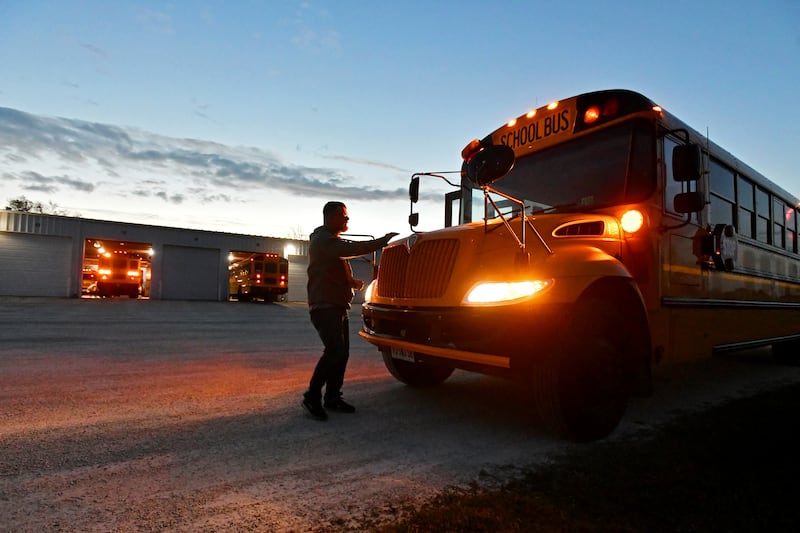Illinois school districts are facing uncertainty after the Trump administration abruptly froze more than $6 billion in federal education grants nationwide, including an estimated $240 million intended for Illinois K-12 schools.
On Monday, the U.S. Department of Education informed states that it would delay issuing grant awards for the upcoming academic year while it reviews funding for multiple programs, including Title I, Title II, Title III and Title IV. Those grants support services such as teacher training, after-school programming, English learner services and student mental health initiatives.
The freeze applies to funding already approved by Congress, and state education leaders say the delay is putting school districts in a difficult position with the 2025-26 school year looming.
“The delay by the Trump administration in issuing federal education funding allocations – for funding that Congress already appropriated – is deeply disruptive, irresponsible and damaging to Illinois’ 1.9 million public school students,” State Superintendent of Education Dr. Tony Sanders said in a statement. “This uncertainty and delay jeopardizes schools’ ability to administer critical services – from after-school programs, to teacher development, to supplemental services for English learners.”
District responses across Illinois have varied based on their reliance on federal aid. At Lockport Township High School District 205, Superintendent Robert McBride said the funding freeze strikes at the core of services for the district’s most vulnerable students.
McBride said total federal funding for the district is 2% to 3% of the total budget.
“To readers, that might not seem like much, right? Surely we can figure out a way to live without that,” McBride said. “But all the federal grants we’re talking about support students with special needs of some kind.”
These students may have an identified disability, a reading delay, the need to learn English or a medical disability that impacts their learning, McBride said.
McBride said District 205 is already identifying areas where it can pause or reduce services, including staffing of paraprofessionals supported by IDEA grants.
The second budget consideration is the potential impact on taxpayers, who “are already paying quite a bit to support their schools locally,” McBride said.
“In our district we know our property tax payers are doing more of their fair share to fund public education,” McBride said. “For me as local school superintendent, it’s reasonable to expect the state and federal government to do by law what is required of them to support public education.”
Other districts anticipate less immediate impact. Sterling Public Schools Superintendent Tad Everett said the district’s key programs such as summer school and after-school care are funded locally and not reliant on the affected grants.
“This potential withholding doesn’t impact us in that we ran summer school in the past with funding from ESSER [Elementary and Secondary School Emergency Relief] money, and that’s what we did,” Everett said. “When that ended a year ago, we did not fund summer school, and so we are not running a summer school program this year. We run all of our after-school programs through our local funding.”
Still, Everett expressed concern about state-level budget issues, particularly to transportation aid, which he said could force fewer bus routes and longer rides for students.
Carl D. Vallianatos, assistant superintendent for McHenry High School District 156, said the district has yet to receive any information about Title II in relation to the announced withholding.
“Title II grant funds can be used by school districts to fund activities related to staff professional development and recruitment and retention of high quality staff members,” Vallianatos said. “Examples may include professional development conferences, speakers, programming, mentors/mentor programs and the like.
“Districts will now need to consider either eliminating all of these associated activities or funding them with local funds.”
DeKalb School District 428 Superintendent Minerva Garcia-Sanchez said her district is still evaluating the potential impact, but noted that the scope of uncertainty surrounding federal education policy has grown since January.
“Many of these evolving directives are difficult to implement and frequently contradict established federal and state laws,” Garcia-Sanchez said. “The prospect of significant funding reductions, coupled with ambiguous guidance, presents an unprecedented challenge for school districts nationwide. Regardless of these complexities, our priority remains clear: to ensure every child receives the high-quality education they are entitled to by law.”
She said the affected grants fund essential programs such as early childhood education, professional development, mental health supports and safe learning environments.
“We anticipate there will be impacts, but it’s too soon to know definitively what may or may not change,” Garcia-Sanchez said. “Our leadership teams are carefully reviewing our current grant allocations and developing contingency plans.”
Joliet Township High School District 204 Superintendent Dr. Karla Guseman said federal funding makes up about 5% of the district’s revenue. While JTHS is better positioned than others, she called the situation “concerning.”
“Thanks to our strong commitment to financial forecasting and long-term planning, JTHS currently maintains a 12-month fund balance, which positions us well to remain stable and responsive in the face of potential funding disruptions,” Guseman said.
Still, she acknowledged the importance of maintaining commitments laid out in the district’s strategic plan and said JTHS will remain alert to possible changes.
The U.S. Department of Education, in its brief communication to states, said it would not issue grant awards “prior to completing [its] review” and is working to ensure funds are spent in accordance with the President’s priorities and the department’s statutory responsibilities.
For now, school leaders across Illinois are left to plan in the dark, forced to make budget decisions without knowing whether some supports for students will be funded at all.
“We are continuing to evaluate impact and next steps,” Sanders said.

:quality(70)/author-service-images-prod-us-east-1.publishing.aws.arc.pub/shawmedia/59fc2deb-4690-4608-b846-d6af698839c4.png)